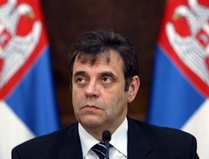- Serbia
Get to know Serbia
- Citizens
Culture and science
Health services
Pension and disability insurance
- Business
Employment
Economy
- Media
- Government
- Contact
Keep in touch
Contact form
Back
Keepin touch
Whether you have a question, comment, suggestion or any problem in the purview of the government, send us your message and we will try to respond as soon as possible. If your problem is not in our purview, we will forward your message to the relevant institution.
Q:
A:
No alternative to Serbia’s European future
Belgrade,
21 September 2005
Serbian Prime Minister Vojislav Kostunica said that the cooperation with the tribunal in The Hague will be carried out in full, and that in no way will it influence either the beginning or the course of talks with the EU.
In an interview with the “Mreza” production group, Kostunica pointed out that the extradition of Ratko Mladic will not be a prerequisite for the commencement of talks on the Stabilisation and Association Agreement with the EU (SAA), but it will influence its signing and a lot of other things. The completion of the cooperation with the tribunal in The Hague is of crucial importance to Serbia, he added.
He said that the Serbian government has reached a high level of cooperation with the tribunal, adding that this cooperation will be continued until it is completed.
Kostunica also said he expects the talks with the EU to start in October. It is highly important for Serbia to start negotiations with the EU, and the Serbian government is entirely dedicated to this, he added.
The future of Serbia, that is, the future of Serbia-Montenegro in Europe has absolutely no alternative. There is no alternative for a country that by its history, geography, culture and economy is a European country, the Prime Minister stressed.
He added that, unlike some other essential issues of great importance for the state and its future, there is full political consensus concerning the issue of EU accession.
However, Kostunica said that though time is now invaluable, it is not always spent in the best way, with certain unnecessary spats further slowing down the pace. He pointed out that the message from Brussels is quite clear – Serbia and Montenegro will sooner join the EU together than as two separate states.
“It is more than evident and I believe that the more the talks continue, the more will the notion of a joint state prevail. Therefore, this integrative idea should be put above any other disintegrative turn of mind”, the Prime Minister explained.
Kostunica said that the affair concerning the purchase of army equipment bears no consequence to the state union’s future, nor could it influence the upcoming talks on EU accession.
These two things should be cleared up, Kostunica explained, saying that first is the contentious contract on the purchasing of army equipment and the second is a problem that concerns the policy of the state union, which, he said, have nothing in common with each other.
He said that the Serbian government has reached a high level of cooperation with the tribunal, adding that this cooperation will be continued until it is completed.
Kostunica also said he expects the talks with the EU to start in October. It is highly important for Serbia to start negotiations with the EU, and the Serbian government is entirely dedicated to this, he added.
The future of Serbia, that is, the future of Serbia-Montenegro in Europe has absolutely no alternative. There is no alternative for a country that by its history, geography, culture and economy is a European country, the Prime Minister stressed.
He added that, unlike some other essential issues of great importance for the state and its future, there is full political consensus concerning the issue of EU accession.
However, Kostunica said that though time is now invaluable, it is not always spent in the best way, with certain unnecessary spats further slowing down the pace. He pointed out that the message from Brussels is quite clear – Serbia and Montenegro will sooner join the EU together than as two separate states.
“It is more than evident and I believe that the more the talks continue, the more will the notion of a joint state prevail. Therefore, this integrative idea should be put above any other disintegrative turn of mind”, the Prime Minister explained.
Kostunica said that the affair concerning the purchase of army equipment bears no consequence to the state union’s future, nor could it influence the upcoming talks on EU accession.
These two things should be cleared up, Kostunica explained, saying that first is the contentious contract on the purchasing of army equipment and the second is a problem that concerns the policy of the state union, which, he said, have nothing in common with each other.
-
 Belgrade/Brussels, 19 November 2025
Belgrade/Brussels, 19 November 2025European integration shared responsibility of entire society
-
 Belgrade, 29 October 2024
Belgrade, 29 October 2024State moves to minimise advertising for betting shops
-
 Belgrade/Berlin, 28 January 2016
Belgrade/Berlin, 28 January 2016Fences cannot stop migrations
-
 Belgrade, 7 January 2016
Belgrade, 7 January 2016Serbia to experience dynamic economic growth in 2016
-
 Belgrade, 31 December 2015
Belgrade, 31 December 2015Serbia will persevere on path of development, reforms
-
 Belgrade, 30 December 2015
Belgrade, 30 December 2015Ground for Serbia’s progress set
-
 Belgrade, 28 December 2015
Belgrade, 28 December 2015Serbia ready for improvement of cooperation with Russia
-
 Belgrade, 22 December 2015
Belgrade, 22 December 2015Serbia ready to open six more chapters next year
-
 Belgrade, 21 December 2015
Belgrade, 21 December 2015Serbia to be part of EU by 2020
-
 Belgrade, 20 December 2015
Belgrade, 20 December 2015Serbia ready for EU membership by 2019


